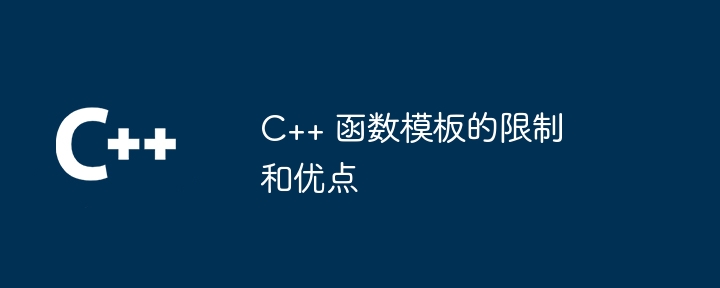Home >Backend Development >C++ >Limitations and advantages of C++ function templates
Limitations and advantages of C++ function templates
- WBOYWBOYWBOYWBOYWBOYWBOYWBOYWBOYWBOYWBOYWBOYWBOYWBOriginal
- 2024-04-14 08:18:02689browse
Function template restrictions: static member functions cannot be declared and template recursion cannot be performed. Compilation time consumption function template advantages: code reuse, generic programming, safe type checking and efficient

Limitations and advantages of C function templates
Introduction
Function templates are a powerful feature in C that allow us to create common backbone code that defines functions. Without having to write a full set of functions for each type variation. It can greatly simplify code and improve code reusability.
Restrictions
- Cannot declare static member functions: Function templates cannot declare static member functions for classes because they are compiled at compile time Instantiated based on the given type.
- No template recursion: A function template cannot call itself because this would lead to infinite recursion.
- Compile time consumption: Function templates are instantiated at compile time, which may result in significant compile time overhead if there are many type instances or complex template parameters.
Advantages
- Code reuse: Function templates allow us to use a single template function definition to handle different types of data, Thereby eliminating code duplication.
- Generic programming: Function templates provide a basis for generic programming, allowing us to write general algorithms and data structures that apply to various types of data.
- Safe type checking: The compiler performs type checking of template parameters to ensure that no type errors will occur at runtime.
- Efficient: After compilation, the instantiation code of a function template is as efficient as an ordinary function written for a specific type.
Practical case
Consider a function template for finding the largest element in a given container:
template <typename T>
T findMax(const vector<T>& v) {
T max = v[0];
for (size_t i = 1; i < v.size(); i++) {
if (v[i] > max) {
max = v[i];
}
}
return max;
}Use this template function , we can easily find the largest element in different types of containers:
vector<int> v1 = {1, 2, 3, 4, 5};
cout << findMax(v1) << endl; // 输出:5
vector<double> v2 = {1.2, 3.4, 5.6, 7.8, 9.0};
cout << findMax(v2) << endl; // 输出:9.0Conclusion
C function templates provide a powerful mechanism to improve code reusability, Versatility, safety, and simplifying generic programming. Understanding its limitations can help us avoid pitfalls and maximize the benefits of function templates.
The above is the detailed content of Limitations and advantages of C++ function templates. For more information, please follow other related articles on the PHP Chinese website!

